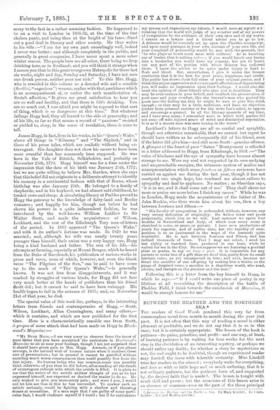BETWEEN THE HEATHER AND THE NORTHERN SEA.*
THE readers of Good Words pondered this very fur from commonplace novel from month to month during the year just past. It is not often that this way of reading a novel is either pleasant or profitable, and we do not say that it is so in this case ; but it is certainly appropriate. The lesson of the book is patience—its pains, penalties, and profit—and one way, at least. of learning patience is by waiting for four weeks for the next step in the elucidation of an interesting mystery, or perhaps we should rather say doubt ; for whether a story be mysterious or not, the end ought to be doubtful, though an experienced reader may foretell the issue with tolerable certainty. Miss Linskill tries her readers to the utmost ; everybody waits for everything, and does so with so little hope and so much suffering, that it is not ordinary patience, but the patience born of, and supported by, the deepest faith that is neede I. The lesson is taught with much skill and power ; but the occasions of this lesson arise in an absence of common-cense on the part of the three principal actors that is quite inconsistent with the practical vigour of two of them—George Kirkoswald and Dorothy Craven—and with the experience of the third—Mr. Bartholomew. This is the great defect in the construction of the plot ; and the second is the absence of sufficient incident. There is nothing to relieve the tedium of constant waiting for the fog of circumstance to rise ; for Mc incident of the book—the shipwreck—comes before the fog has settled ("own and enveloped the unhappy wayfarers. It• is a remarkable be olf ; but whether its beauty or its faults prerail, is a problem for the reader to master. We think, indeed, that they are fairly balanced. It reads to us like the work of a woman whose sole preparation for writing has been her communion with books and Nature, who writes from her own conception Lod not from her experience of human character. Her intimacy with books is wide and apparent—so apparent, indeed, that were it not that to cultivated persons of solitary habits it is no more strange to quote books than it is to sociable denizens of cities to quote the papers and the gossip of the day, we should be inclined to call the authoress of the story before us—we cannot use its name, it is so long a one—pedantic. Shakespeare, Milton, Keats, Shelley, Kingsley, Carlyle, Browning, Tennyson, and many more are constantly supplying illustration, and their sayings are apparently quite the natural language of our authoress's ,ira /nab's, ptysonw. The beautiful mottoes to the chapters would make-up a choice extract-book ; and the very names of them— though we are frequently at a loss to make out their appropriateness—are all quotations. Again, the familiarity with Nature is as evident as that with books. The grandest passage in the story describes with wonderful vividness and with subtle delicacy the shifting scenes of a great sea-storm. We wish we could quote it, but it is too long, and must not be mutilated; and the aspects of the wild, high moorlands, the lonely, desolate, and reedy marshes, the rare bits of corn-land, the sheltered orchard, whether by night or day, in winter or in summer, or in lovely, cheerful spring, in the storm or in the sunshine,—all these aspects of Nature on the Yorkshire Moors and on its dangerous shores are sketched with the same perfect knowledge, the same fine perception of minute differences and changes, and the same sense of beauty and of the divine origin of it all. Take two such passages as these, and there are many such.—The first, of Spring :— " To have lived but for one spring in the very heart of spring is to have had a joy that might be desired by the angels. No poem, no picture could give for an instant the sense of universal benediction that comes down with the full sudden bursting of springtide over the land. There is always a suddenness, always one morning when the tidings are flashed in glad thrilling notes from bough to bough ; when the sunshine is sweeter and milder—the air fuller of quiet promise of blessing. There is always one day when the valleys laugh and sing more gloriously, and when the hills are more joyful together before the Lord. To every ' flower o' the spring' there is a season, from the first snowdrop that peeps from under the dry, dead leaves at the bottom of the wood, to the last hawthorn bud that bursts on the top of the late white hedgerow. And yet there is always as it were a meeting of seasons—a time when the flowers come up that they may be together for a while."



































 Previous page
Previous page